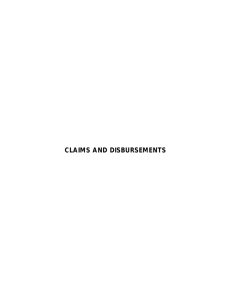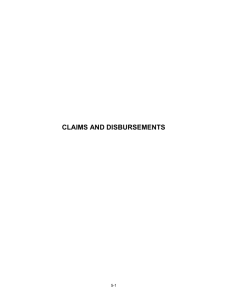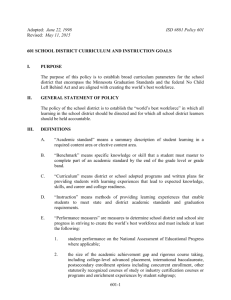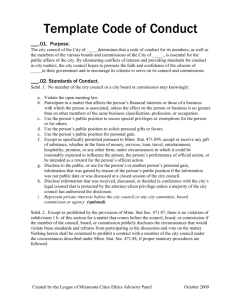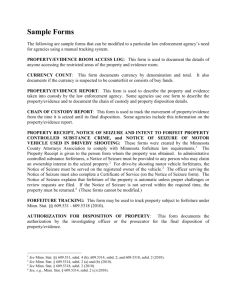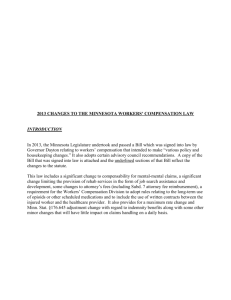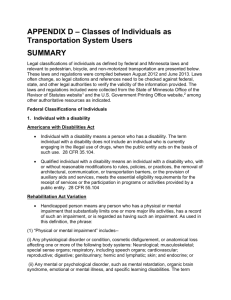claims and disbursements - Office of the State Auditor
advertisement
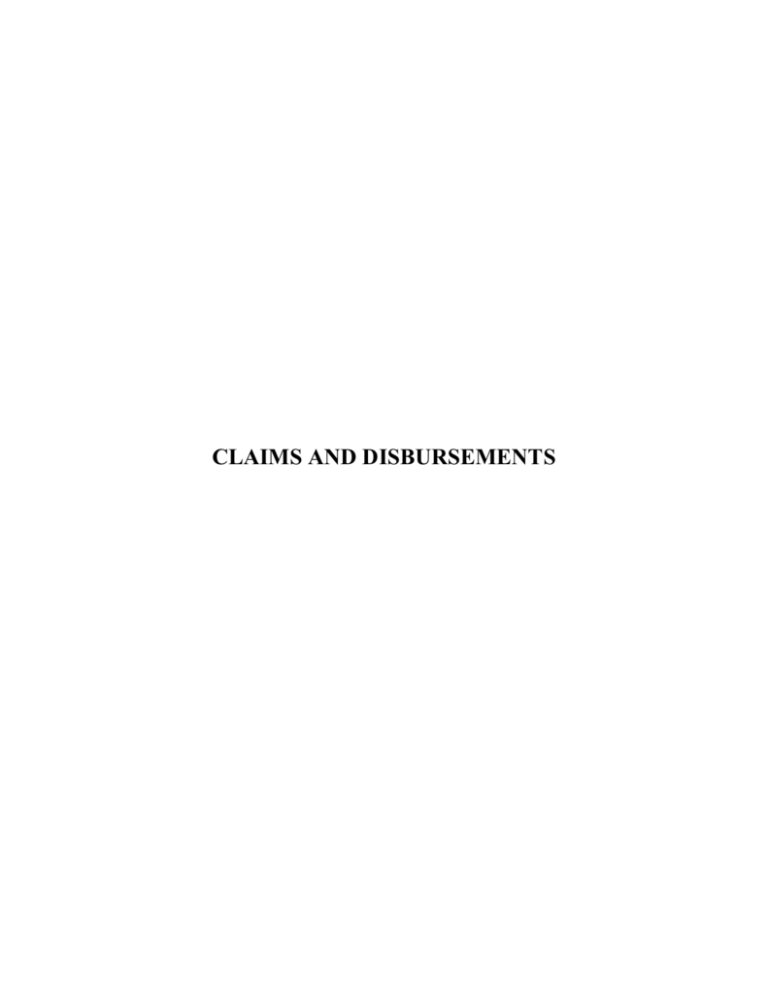
CLAIMS AND DISBURSEMENTS LEGAL COMPLIANCE AUDIT GUIDE CLAIMS AND DISBURSEMENTS Introduction Municipal transactions involving an account, claim, or demand made for any property or service which can be itemized in the ordinary course of business and disbursements of municipal funds are covered in this section. “Municipality” for the purposes of this section means a county; local social services agency; county board of education for unorganized territory; school district; charter school; town or home rule charter city of the second, third, or fourth class; or park district. This section also applies to statutory cities. In addition, Minn. Stat. § 471.425 (Prompt Payment of Local Government Bills), applies to any home rule charter or statutory city, county, town, school district, political subdivision, or agency of local government. It also applies to the Metropolitan Council and any board or agency created under Minn. Stat. ch. 473. 12/2014 5-1 Minn. Stat. Section CLAIMS AND DISBURSEMENTS Yes Part I. General Provisions - For Municipalities § 471.38, subd. 1 A. Has every person or the person’s agent claiming payment put such claim in writing (which includes an electronic transaction record) by items? B. Has each declaration for payment (described below) been signed to the effect that such account, claim, or demand is just and correct and that no part of it has been paid? § 471.38, subd. 2 Note: The provisions of this section do not apply to any claim or demand for an annual salary or fees of jurors or witnesses, fixed by law, nor to the salary or wages of any employee whose salary or wages have been fixed on an hourly, daily, weekly, or monthly basis, by the governing board of the municipality, and which is now authorized by law to be paid on a payroll basis. § 471.391, subd. 1 Declaration Form - The declaration is sufficient if in the following form: “I declare under the penalties of law that this account, claim or demand is just and correct and that no part of it has been paid.” ________________________________________________________ (Signature of Claimant) § 471.391, subd. 2 The check or order-check by which the claim is paid may have printed on its reverse side, above the space for endorsement thereof, the following statement: “The undersigned payee, in endorsing this check (or order-check) declares that the same is received in payment of a just and correct claim against the county (county board of education for unorganized territory, school district, town or city), and that no part of it has heretofore been paid.” When endorsed by the payee named in the check or order-check, such statement shall operate and shall be deemed sufficient as the required declaration of the claim. § 471.392 C. Any person who willfully and falsely makes the declaration provided for is guilty of a felony. § 471.425, subd. 2 D. Prompt Payment of Local Government Bills - § 471.425, subd. 2 § 471.425, subd. 4 12/2014 1. Standard payment period is: - 35 days from receipt for governing boards that meet at least once a month; - 45 days from receipt of goods or services or invoice, whichever is later, for governing boards that do not meet at least once per month; and - 45 days from receipt for joint powers entities. Were all bills paid within the time period set by the terms of the contract or within the standard payment period? - The government entity must pay interest on bills not paid in a timely manner. The interest rate is 1½ percent per month or part of a month. The minimum monthly interest on a bill of $100 or more is $10. 5-2 No Workpaper Reference Minn. Stat. Section CLAIMS AND DISBURSEMENTS Yes § 471.425, subd. 4 2. For bills paid after the time period set by the contract or the standard payment period, did the government entity calculate and pay interest as required by law? Note: The interest penalties in these questions do not apply to good faith disputes. § 471.381 Part II. Electronic or Wire Transfer Cities, Towns, and Counties A. § 385.071 If the city, town, or county used electronic or wire transfers to pay claims or make investments: 1. Were the electronic identifiers used to authenticate or validate this government action approved by the governing board? 2. Had the city, town, or county established policies and procedures to ensure the validity of the electronic approvals? 3. In the case of a county, did the county board establish policies and procedures for investment and expenditure transactions by electronic transfer? Part III. Claims and Disbursements - Statutory Cities § 412.271, subd. 1 § 412.271, subd. 2 A. For all disbursements made on orders, were the orders drawn by the mayor and clerk upon the treasurer? B. Have all claims been audited and allowed by the city council, except when issued for payment of judgments, salaries, and wages previously fixed by the council or by statute, principal and interest on obligations, rent and other fixed charges, the exact amount of which has been previously determined by contract authorized by the council or as provided in E and F below, or if the city has delegated authority to approve claims under Minn. Stat. § 412.271, subd. 8? C. Claims and Payment 1. 12/2014 Payroll a. If the city used an electronic time recording system, did the governing body adopt policies to ensure that the timekeeping and payroll methods used are accurate and reliable? b. If the city did not use an electronic time recording system: (1) Has the clerk maintained a payroll record giving the name of each employee and the number of hours or days worked by each? (2) Has the timekeeper, supervisor, or other officers or employees having knowledge of the facts, signed a declaration indicating the facts recited on the payroll are correct to the best of the declarant’s information and belief? (3) Have the claims for payroll been signed in proper form or declaration under Minn. Stat. § 412.271, subd. 2? 5-3 No Workpaper Reference Minn. Stat. Section CLAIMS AND DISBURSEMENTS Yes 2. § 412.271, subd. 3 § 412.271, subd. 4 D. E. F. a. Was the claim prepared in written items (where possible in the ordinary course of business)? b. Has a declaration for payment been signed that the claim is just and correct and no part of it has been paid, or was the declaration made by endorsement as provided in Minn. Stat. § 412.271, subd. 3? Endorsement of Claims 1. Has the clerk endorsed each claim with either “disallowed” or “allowed in the sum of $ ,” if approved in whole or in part and specifying the items rejected, if any? 2. Has each order been drawn so that when signed by the treasurer it became a check? 3. Has each order presented to the treasurer and not paid for want of funds been so marked and paid in order of its presentation with interest from the date of presentation? Immediate Payment of Claims 1. § 412.271, subd. 5 Other claims for payment for goods or services. Have all claims based on contract paid prior to a council meeting been signed by a majority of the council and formally approved at the next council meeting? Imprest Funds 1. Has a custodian been appointed for each imprest fund? 2. Has money for the imprest fund been transferred from the general fund? 3. Have all claims been itemized and presented to the council at the next council meeting after payment has been made? 4. Has the council issued orders covering imprest fund claims? 5. Have all claims been approved in full and/or has the custodian replaced the difference for which he or she is personally responsible? Part IV. Independent Board Powers--Statutory Cities (Utility & Park Boards) § 412.271, subd. 6 12/2014 A. Has any independent board, which is authorized to disburse funds without the approval of the council, met the requirements of Minn. Stat. § 412.271, subds. 4 and 5 (found as Part III.E. and III.F., above)? 5-4 No Workpaper Reference Minn. Stat. Section CLAIMS AND DISBURSEMENTS Yes Note: In reviewing the above subdivisions with regard to independent boards, the term “council” shall be considered to be the “board or commission” and the money for the fund may be obtained from any undedicated fund under its jurisdiction. Part V. Claims and Disbursements - Counties § 384.13 For all disbursements made on warrants: A. B. C. Was the claim paid by the county treasurer upon allowance of the county board, upon the warrant of the board chair, attested by the county auditor; or Was the claim paid upon the warrant of the auditor, upon the proper certificate of the person, officer, or tribunal allowing the claim in cases in which the precise amount was fixed by law, or authorized to be fixed by some other person, officer, or tribunal, was the claim? If the county population was 150,000 or less, was each warrant so drawn that when signed by the treasurer it becomes a check on the county depository? Part VI. Delegation of Authority to Pay Claims - Counties and Statutory Cities §§ 412.271, subd. 8, & 375.18, subd. 1b A. Did the county board or city council delegate its authority to pay certain claims made against the county or city by adopting a resolution authorizing a specified county or city administrative official to pay the claims that meet the standards and procedures established by the board or council? B. Does the county board or city council have adequate internal accounting and administrative control procedures to ensure the proper disbursement of public funds, including regular and frequent review of the county or city administrative officials’ actions by the board or council? C. Was a list of all claims paid under the procedures established by the county board or city council presented to the board or council at the next regularly scheduled meeting after payment of the claim? and 1. In the case of a city, is the city one which prepares annual audited financial statements which have been attested to by an independent certified public accountant, public accountant, or the state auditor? or 2. In the case of a county, is the county not a home rule charter county for which the county charter provides an alternative method of paying claims? Part VII. Client-Directed Support Program - For Counties § 375.18, subd. 1c 12/2014 A. If the county has implemented a client-directed support program that authorizes responsible parties for county human services and public health clients to expend public funds for the benefit of the clients without complying with Minn. Stat. §§ 375.18, subd. 1b; 384.13; 471.38; or 471.391: 1. Was the program implemented by the county board upon approval by the department of human services? 2. Does the county board have internal accounting and administrative control procedures to ensure proper disbursement of public funds? 5-5 No Workpaper Reference Minn. Stat. Section CLAIMS AND DISBURSEMENTS Yes 3. Do these procedures include county-owned demand deposit accounts and periodic review of the program by the county board? Part VIII. Electronic Funds Transfer - For School Districts §§ 471.38, subds. 3 and 3a A. School districts may make electronic funds transfers under certain conditions. 1. a. a claim for payment from an imprest payroll bank account or investment of excess money; b. payment of tax or aid anticipation certificates; c. payment of contributions to a pension or retirement fund; d. vendor payments; and e. payment of bond principal, bond interest, and a fiscal agent service charge from the debt redemption fund. B. Did the school district use electronic funds transfers only for the above enumerated transactions? C. Did the school district enact a plan containing the following policy controls requiring: 1. annual delegation of authority to make electronic funds transfers to a designated business administrator? 2. the disbursing bank to keep a certified copy of delegation of authority? 3. identification of the initiator of each electronic transfer? 4. the initiator to document the request and obtain approval for each transfer from the designated business administrator, prior to the transaction? 5. written confirmation of each transaction within one business day? 6. a list of transactions to be submitted to the school board at the next regular meeting after the transaction? § 375.171 Part IX. Credit Card Purchases - For Counties A. 12/2014 A school district may make electronic funds transfers for: If a county officer or employee made a purchase on behalf of the county by credit card: 1. Had the county board authorized the use of the credit card by the officer or employee; 2. Was the officer or employee otherwise authorized to make a purchase on behalf of the county; and 5-6 No Workpaper Reference Minn. Stat. Section CLAIMS AND DISBURSEMENTS Yes 3. § 375.17 Did the purchase otherwise comply with all statutes, rules, or county policies applicable to county purchases? B. If a county officer or employee made a purchase by credit card that was not approved by the county board, was the officer or employee held personally liable for the amount of the purchase? C. If publishing of disbursement was required, were actual vendors providing goods and services to the public entity identified and not just the credit card company? § 367.18 Part X. Claims and Disbursements – For Towns A. B. Were amounts paid on orders paid by the town treasurer, on the order of the town board, signed by the chair and countersigned by the clerk? [Note: In towns with a clerk/treasurer, the clerk/treasurer need sign only once. Was each order drawn so that when signed by the treasurer or clerk/treasurer in an appropriate place, it becomes a check on the town depository? Part XI. Payments With Credit Cards - For Cities, Towns and School Districts §§ 471.382 & 123B.02, subd. 23 A. B. 12/2014 If a city, town, or school district officer or employee made a purchase on behalf of the city, town, or school district by credit card: 1. Had the city council, town board, or school district authorized the use of the credit card by the officer or employee; 2. Was the officer or employee otherwise authorized to make a purchase on behalf of the city, town, or school district; and 3. Did the purchase otherwise comply with all statutes, rules, and city, town, or school district policies applicable to city, town, or school district purchases? If a city, town, or school district officer or employee made a purchase by credit card that was not approved by the city council, town board, or school district, was the officer or employee held personally liable for the amount of the purchase? 5-7 No Workpaper Reference Part XII. Audit Conclusion The auditor must state a conclusion--based on this questionnaire and any other audit procedures performed--whether the client has complied with the legal provisions reviewed relating to claims and disbursements. Conclusion: 12/2014 5-8
